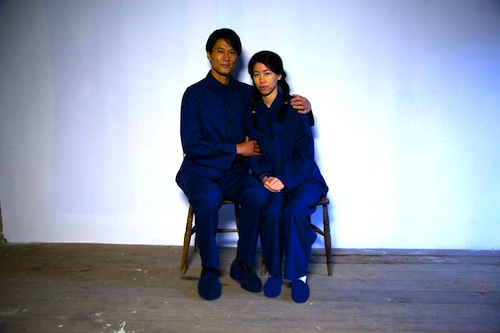By Joe Bendel. Paradoxically, it might have been the ardent loyalty of Jian Ping’s persecuted parents that saved them during the Cultural Revolution. At least, they never said anything incriminating their children would have been forced to repeat. Yet, the lingering trauma of the experience makes it difficult for her to relate to her Americanized daughter, Lisa Xia. By exploring their family history, the two women come to terms with their own relationship in Susan Morgan Cooper’s hybrid-documentary, Mulberry Child, which opens this Friday in New York at the Quad Cinema.
True believers, Hou Kai and Gu Wenxiu met and married through the Chinese Communist Party. They bought into the Party’s early rhetoric, which proved to be a profound mistake during the “Anti-Rightist Campaign.” Trying to defend a wrongfully accused colleague, Hou only succeeded in putting himself in the Party’s crosshairs. Despite some trying moments, Jian’s father made it through the first reign of terror, demoted but relatively unscathed. The Cultural Revolution would be a different story entirely.
As a school administer, Jian’s mother was directly in the line of fire. To make matters worse, her father’s history as a one-time Japanese POW was a red flag for the empowered zealots. As the institutionalized madness escalated, Jian’s father was imprisoned and her mother was held a de-facto captive in her school’s boiler room, forced to write self-criticism and pressured to denounce her husband. Largely raised by their grandmother, the children went months without seeing either parent.
How cowardly and cruel must an ideology be that it would force a seven year old girl to condemn her father in school? Yet, the Maoist cult continues to seduce Western academics who never had to live through it. Somehow, though, Jian’s parents still cling to their faith, as if by acknowledging that the source of the horror they lived through—the Chinese Communist Party—would somehow make all their suffering for naught.

Jian and her daughter can apprise the past with more clarity, but they remain susceptible to a romanticized vision of contemporary China. Ironically, their big coming together moment happens during the Beijing Olympic Games, against the backdrop of the striking Bird’s Nest stadium, designed by Ai Weiwei. Yet, the government’s relentless campaign against the artist and teacher ought to undermine the superficial images the Party tries to present to the world.
Nonetheless, when looking backward, Mulberry is quite forceful and moving. Combining Jacqueline Bisset’s voice-overs with dramatized episodes from Jian’s memoir, Morgan Cooper vividly conveys an innocent child’s perspective on an era of state sanctioned insanity. Jody Choi and Bruce Akoni Yong are particularly affecting as young Jian and the much abused Hou (“The Big Traitor”), respectively. However, the candid-style mother-daughter conversations do not carry the same dramatic weight. Yes, there is something universal to their generational disconnect, but it pales in comparison to her experience visiting her father in prison—unaccompanied because only a seven year old girl could visit a suspected enemy of the state without reprisals.
Of course, the difficulties survivors like Jian have expressing affection are the least of the Cultural Revolution’s tragic legacy, but it is what most directly affects her and her daughter. Sensitively produced, Mulberry Child is recommended for its up-close-and-personal insight into the chaos unleashed by Mao’s regime (rather than its wishful thinking for today’s China) when it opens this Friday (9/7) at New York’s Quad Cinema.
LFM GRADE: B
Posted on September 4th, 2012 at 2:34pm.